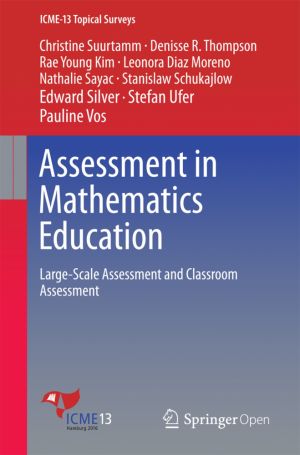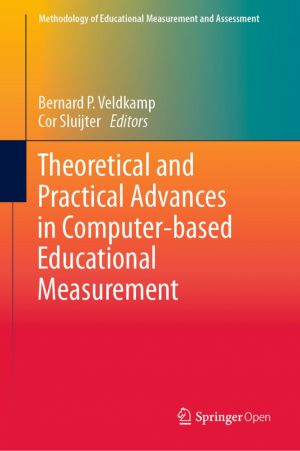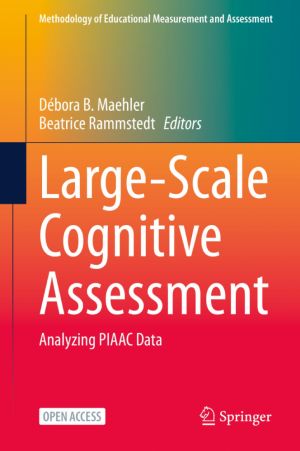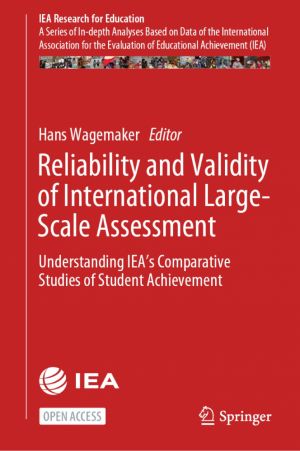Reliability and Validity of International Large-Scale Assessment
Understanding IEA’s Comparative Studies of Student Achievement
by Hans Wagemaker
DescriptionDetailsHashtagsReport an issue
Throughout the now considerable history of IEA's international large-scale assessments, establishing the quality of the data has been paramount. Research in the complex multinational context in which IEA studies operate imposes significant burdens and challenges in terms of the methodologies and technologies that have been developed to achieve the stated study goals. The demands of the twin imperatives of validity and reliability must be satisfied in the context of multiple and diverse cultures, languages, orthographies, educational structures, educational histories, and traditions. Readers will learn about IEA's approach to such challenges, and the methods used to ensure that the quality of the data provided to policymakers and researchers can be trusted. An often neglected area of investigation, namely the consequential validity of ILSAs, is also explored, examining issues related to reporting, dissemination, and impact, including discussion of the limits of interpretation.
The final chapters address the question of the influence of ILSAs on policy and reform in education, including a case study from Singapore, a country known for its outstanding levels of achievement, but which nevertheless seeks the means of continual improvement, illustrating best practice use of ILSA data. 






Book Description
This open book describes and reviews the development of the quality control mechanisms and methodologies associated with IEA's extensive program of educational research. A group of renowned international researchers, directly involved in the design and execution of IEA's international large-scale assessments (ILSAs), describe the operational and quality control procedures that are employed to address the challenges associated with providing high-quality, comparable data.Throughout the now considerable history of IEA's international large-scale assessments, establishing the quality of the data has been paramount. Research in the complex multinational context in which IEA studies operate imposes significant burdens and challenges in terms of the methodologies and technologies that have been developed to achieve the stated study goals. The demands of the twin imperatives of validity and reliability must be satisfied in the context of multiple and diverse cultures, languages, orthographies, educational structures, educational histories, and traditions. Readers will learn about IEA's approach to such challenges, and the methods used to ensure that the quality of the data provided to policymakers and researchers can be trusted. An often neglected area of investigation, namely the consequential validity of ILSAs, is also explored, examining issues related to reporting, dissemination, and impact, including discussion of the limits of interpretation.
The final chapters address the question of the influence of ILSAs on policy and reform in education, including a case study from Singapore, a country known for its outstanding levels of achievement, but which nevertheless seeks the means of continual improvement, illustrating best practice use of ILSA data.
This open book is licensed under a Creative Commons License (CC BY-NC). You can download Reliability and Validity of International Large-Scale Assessment ebook for free in PDF format (3.7 MB).
Book Details
Title
Reliability and Validity of International Large-Scale Assessment
Subject
Education and Teaching
Publisher
Springer
Published
2020
Pages
279
Edition
1
Language
English
ISBN13
9783030530808
ISBN10
3030530809
ISBN13 Digital
9783030530815
ISBN10 Digital
3030530817
PDF Size
3.7 MB
License

Related Books

This volume offers insights from modeling relations between teacher quality, instructional quality and student outcomes in mathematics across countries. The relations explored take the educational context, such as school climate, into account. The International Association for the Evaluation of Educational Achievement's Trends in Mathematics a...

This book provides an overview of current research on a variety of topics related to both large-scale and classroom assessment. First, the purposes, traditions and principles of assessment are considered, with particular attention to those common to all levels of assessment and those more connected with either classroom or large-scale assessment. A...

This open access thematic report identifies factors and conditions that can help schools and education systems promote tolerance in a globalized world. The IEA's International Civic and Citizenship Study (ICCS) is a comparative research program designed to investigate the ways in which young people are prepared to undertake their roles as citi...

Does the Nordic model of education still stand by its original principles and safeguard education for all? This open volume is a carefully crafted collection of chapters that investigate the different aspects of equity, equality and diversity across the education systems in the Nordic countries. Based on data from various national and international...

This book presents a multitude of different, yet related, innovations in educational measurement and provides insight in their practical possibilities.The book not only addresses several improvements in the quality of educational measurement and innovations in (inter)national large scale assessments, but also several advances in psychometrics and i...

This open methodological book summarises existing analysing techniques using data from PIAAC, a study initiated by the OECD that assesses key cognitive and occupational skills of the adult population in more than 40 countries. The approximately 65 PIAAC datasets that has been published worldwide to date has been widely received and used by an inter...

